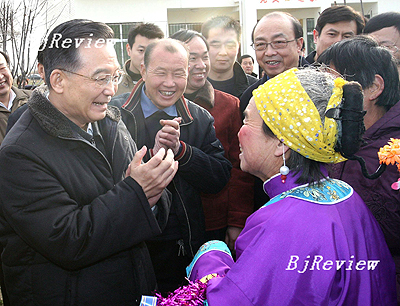|

Invariable Policies
Making a speech at the New Year's Day gathering held by the National Committee of the Chinese People's Political Consultative Conference on the first day of 2008, Chinese President Hu Jintao stressed the Central Government's unchanging policies on Hong Kong, Macao and Taiwan.
He said China will continue to adhere to the principle of "One Country, Two Systems" and "Hong Kong people governing Hong Kong, Macao people governing Macao with a high degree of autonomy."
Elaborating on China's stance on Taiwan, Hu said, "We will also adhere to the basic principle of ‘peaceful reunification and one country, two systems' ... oppose secessionist activities, work for the well-being of compatriots on both sides of the Taiwan Straits and strive for peace in the region."
Landmark Law on Labor Rights
A new Labor Contract Law, which has been welcomed by employees as a tool to uphold their interests, was put into effect on January 1.
The 98-article law, approved by the National People's Congress (NPC), China's top legislature, in June 2007, entitled staff with more than 10 years of service at a company the right to sign contracts that would protect them from dismissal without cause.
It also required employers to contribute to their employees' social security accounts and set wage standards for workers on probation and overtime.
Statistics indicated about 40 percent of private-sector employees lacked labor contracts. Critics also charged unpaid wages, forced labor and other abuses have accompanied China's economic boom.
Olympic Member Hotels Unveiled
Beijing Olympic organizers have unveiled 132 official reception hotels for next year's Games, which are selected to offer lodgings to officials of the International Olympic Committee and the International Sports Federations, officials and guests of the various National Olympic Committees, accredited media, sponsors and their guests.
The Beijing Organizing Committee for the Games of the XXIX Olympiad (BOCOG) announced that of the 120 contracted hotels in Beijing, 38 are five-star hotels, 45 are four-star, 22 are three-star and 15 are not yet star-rated. The hotels supply about 30,000 rooms in total.
BOCOG said the average room rate for a double room in a five-star hotel is 2,799 yuan ($383), and 2,155 yuan ($295) in a four-star hotel.
The other 12 official reception hotels are in six co-host cities, including Hong Kong, Shenyang, Tianjin, Qingdao, Qinhuangdao and Shanghai.
Universal Suffrage in Hong Kong
The Standing Committee of NPC made a decision in Beijing on the constitutional development of the Hong Kong Special Administrative Region (HKSAR), which said that the election of the fifth HKSAR Chief Executive in the year 2017 may be implemented by the method of universal suffrage.
The decision also said that after the Chief Executive is selected by universal suffrage, the election of HKSAR Legislative Council may be implemented by the method of electing all the members by universal suffrage.
In its commentary on December 30, Hong Kong-based newspaper South China Morning Post said the NPC Standing Committee's decision is a significant attempt to end the decades-long debate over universal suffrage in Hong Kong.
Cleaner Gasoline
Beijing introduced new vehicle fuel standards on January 1, which should cut annual sulphur dioxide emissions by 1,840 tons, said Feng Yuqiao, head of the motor vehicle department of the Beijing Environment Protection Bureau.
Under the new standard, gasoline and diesel sold at all outlets in the capital city must meet the new China IV standards, which are equivalent to the European Union's Euro IV standards, according to Du Shaozhong, Deputy Director of the bureau.
The China III standards, equivalent to their EU counterparts, have reduced sulphur dioxide emissions from automobiles by 2,480 tons annually since they took effect at the end of 2005, according to official statistics. | 